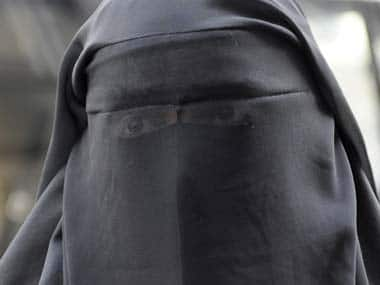By Hasan Suroor London: It might be fun watching the villain in a Bollywood film escape in a burqa, but not so in real life, especially in a culturally polarised climate with suspicion of “alien” cultures bubbling just under the surface . A heated political row has erupted in Britain amid calls for a French-stylepublic ban on burqa after a terror suspect under police surveillance gave slip to his handlers by dressing in a black top-to-toe veil likened by one senior cabinet minister to a bin “bag”. It is the second such incident though separated by seven years (the previous one happened in 2006 ) and comes on the heels of the controversy over a woman’s refusal to remove her “niqab’’ before a judge claiming that Islam did not permit women to show their face in the presence of men. Clearly, the two cases are of a very different nature,but in the public mind they are linked by a common thread: the burqawith its image of a “sexist” and " oppressive" symbol of an “intolerant” religion. And when a Muslim extremist uses this suspicious and widely despised piece of “Islamic clothing” to flee the law it is promptly dubbeda“threat” to national security which can be dealt with only by outlawing it. [caption id=“attachment_196367” align=“alignleft” width=“380”]  Reuters[/caption] Rather than blaming the security lapse on the police an outraged nation –egged on by sections of the right-wing media—has turned on the poor burqa. Admittedly, burqa has a lot of problems with it (it is sexist, medieval, oppressive and meant to shut off women from the outside world) and there are some very good arguments for banning its use in public. But to demand a ban on it because a criminal has used it as a disguise which, by the way, is the oldest trick in the book is carrying theburqa-phobia a bit too far. A few months ago, another terror suspect escaped in a black cab as cops watched helplessly. Are we, then, going to ban black cabs next? Or as Shahid Malik, a former Labour MP, pointed out, “There have been many hundreds of cases where robberies have been committed by men wearing women’s stockings on their heads - but no one is talking about banning stockings.’’ The row broke out after Mohammed Ahmed Mohamed (27), accused of having links with the Somali terror group al-Shabab, disappeared after being seen entering a west London mosque in “western style clothes’’. Police claimed that a figure later spotted leaving the mosque in “Islamic clothing’’ was him. CCTV footage, released by Scotland Yard, shows Mohamed entering mosque in a fleece jacket and a person of similar physique leaving in a burqa. He is still at large. In Parliament, Home Secretary Theresa May was jeered for defending “the right of a woman to decide how she dresses’’. “This is not about telling women what to wear. The issue is about allowing someone to conceal their identity,’’ said Tory MP, Philip Hollobone, echoing calls for a ban. Even the normally sober and one of the most liberal Tory figures, Ken Clarke, a cabinet minister, weighed in describing it as “a most peculiar costume for people to adopt in the 21st century’’ . The Times commented that “a commitment to religious liberty cannot compromise a democracy’s determination to defend itself’’. Since France imposed a ban on burqa and public display of other symbols of religious identity, the British government has been under growing pressure to follow suit. Ministers have called for a national debate on the issue and Britain’s most senior judge, Lord Thomas, the Lord Chief Justice of England and Wales, is due to issue guidance on whether Muslim women can wear burqa in court. There are many liberal voices within the Muslim community who have publicly questioned their fellow Muslims’ “fixation’’ with the so-called Islamic dress code and criticised them for propagating a negative image of Islam. But the shrill public reaction to the antics of “the burqa fugitive’’ has led even liberal Muslims to cry foul and there is a risk of a backlash against the “Tory Taliban’’. Liberal campaigners like Shaista Gohar, chair of Muslim Women’s Network, detect a whiff of Islamophobia behind the demand for a burqa ban and fear that it risks undermining their own campaign against regressive cultural practices in their community. The problem arises from conflating two different issues—the right of Muslim women to dress as they like and their bid to invoke their cultural or religious identity to demand exception from normal rules of the society and the land of the law—as the woman who refused to lift her veil in the court did. It is not difficult to strike a balance between the two. If Muslim women want to wear the burqa, however distasteful it might be to others, let them do it but it must be made clear to them that they would not be allowed to use it to claim special status and circumvent rules that apply to all other citizens. It is important that police and security services should be able to stop anyone they have suspicions about, whatever they are wearing, without being accused of Islamophobia. Britain has a good record of multiculturalism and the phobia with burqa must not be allowed to spoil it.
A heated political row has erupted in Britain amid calls for a French-stylepublic ban on burqa after a terror suspect under police surveillance gave slip to his handlers by dressing in a black top-to-toe veil likened by one senior cabinet minister to a bin “bag”.
Advertisement
End of Article
Written by FP Archives
see more


)

)
)
)
)
)
)
)
)



